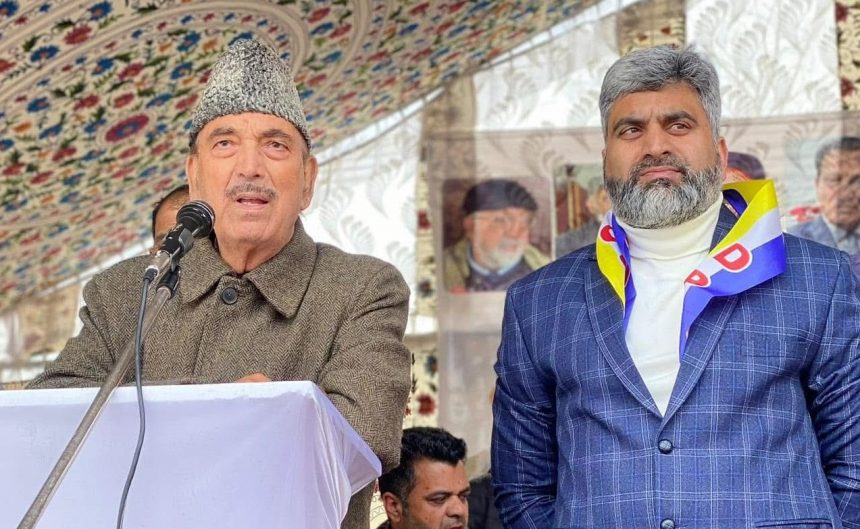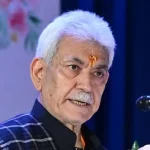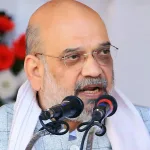In India, particularly in J&K where leaders often seem distant, impersonal and prioritize advancing the careers of their children and family members, my brief yet enriching experience with Azad Sahib was different and a revelation. In the contemporary political landscape where politics is reduced to a hereditary privilege rather than a platform for public service, eroding trust in democratic institutions and fostering disillusionment among citizens. I did not come from a political family, yet I was given an opportunity to contest parliamentary election followed by assembly election, thanks to the vision and inclusivity of Mr. Ghulam Nabi Azad.
Despite not sharing any blood relation with him, he extended his support purely on merit. Although I could not secure a win, yet the experience remains invaluable, reaffirming my belief in the possibility of fair opportunities in politics emphasizing meritocracy over nepotism or familial ties. In the present political scenario where nepotism often trumps merit, Azad sahib’s leadership stands as a beacon of hope for youth and new commers to this field. The short span I worked with Azad sahib, I witnessed a rare blend of wisdom, humility, and vision—qualities that define not just a seasoned politician but a meritocratic and a visionary leader.
A seasoned politician, judicious strategist, and committed public servant, Ghulam Nabi Azad’s journey from the student politics to the highest levels of national politics reflects a legacy built on principles of honesty, unity, integrity, accountability and vision. Starting from Youth Congress to the highest decision making body of Indian National Congress and then flouting his own party in Jammu and Kashmir, it is essential to take stock of the many facets of Azad sahib’s contributions and the lessons his life offers to both present and future generations of leaders. His leadership skills and ability to mobilize youth earned him recognition within the party when he was appointed as the President of the All India Youth Congress in 1980, signaling his arrival on the national stage and marking him as a rising star within the Congress Party.
Same year, Azad sahib made his parliamentary debut and his early administrative skills were evident when he was appointed as a Union Minister of State, handling portfolios like Law, Justice, and Civil Aviation. Ghulam Nabi Azad stands as the only contemporary political leader to have worked with four former Prime Ministers of India—Indira Gandhi, Rajiv Gandhi, P.V. Narasimha Rao, and Dr. Manmohan Singh delivering remarkable service across all his ministerial roles. As Civil Aviation Minister, Azad sahib introduced the Open Sky Policy, significantly reducing flight fares and giving a major boost to tourism. As Health Minister, Ghulam Nabi Azad is celebrated for his pivotal role in making India polio-free; a milestone certified by WHO Secretary-General Margaret Chan and was also instrumental in shaping India’s health policy at a time when the country faced immense challenges in public healthcare.
Effective leadership of Azad sahib in the National Rural Health Mission (NRHM) significantly strengthened India’s healthcare system which was pivotal and a game-changer in India’s efforts to combat preventable diseases, improve maternal health, and tackle malnutrition. It was under his watch that India took significant steps towards improving life expectancy, reducing infant mortality rates, and expanding immunization programs. Despite serving the country at the Union level in various prominent roles, Azad sahib always maintained a deep focus on his native state, Jammu and Kashmir. Whether in policy- making or developmental initiatives, he consistently worked to address the unique challenges faced by the region and this was the reason that Mr Ghulam Nabi Azad in year 2014 as Union Health minister sanctioned five medical colleges for his native state, Jammu and Kashmir by virtue of a single order.
Azad sahib’s consistent focus on his home state remained a hallmark of his career, and his efforts eventually led to his appointment as the Chief Minister of Jammu and Kashmir in November 2005, where he worked tirelessly to improve the region’s infrastructure, enhance education, and foster economic development for all the sections of the society. He has always been keenly aware of the region’s unique ethnic, religious, regional and cultural dynamics. Gh Nabi Azad created history by announcing eight new districts, three subdivisions and 13 tehsils in the state. Ghulam Nabi Azad’s tenure as Chief Minister was defined by an extraordinary work ethic and an unwavering commitment to progress. He introduced the concept of double and even triple shifts for projects like Hajj house, Tulip Garden, New Assembly building, etc, ensuring they were completed in record time—a feat unheard of in the state’s governance history.
Azad sahib’s tenure as Chief Minister was marked by holistic development across all fields, from infrastructure and healthcare to education and rural uplitiment, ensuring that progress was inclusive, balanced, and transformative for the entire region. His strategy of round-the-clock work was not just about speed but about setting a precedent for what is possible when leadership is driven by vision and results and it was through his exceptional leadership that the J&K Assembly became the only one in India to operate six days a week, a provision personally introduced by Ghulam Nabi Azad, reflecting his unwavering commitment to hard work and progress. His ability to achieve in a short span what others couldn’t in decades, even till date is a testament to his dynamic and transformative approach to governance.
In an era when religious, regional and ethnic divisions often dominate the political discourse in the country and in J&K also, Ghulam Nabi Azad’s leadership has always been characterized by equitable development; ensuring progress reached every corner of the state, irrespective of religion, region, or community, reflecting his unwavering commitment to unity and inclusivity. And last but not the least On August 5, 2019, when most rather all leaders from J&K remained silent, Ghulam Nabi Azad stood as a lone voice in Parliament, passionately defending the rights and dignity of the people of Jammu and Kashmir
Azad sahib embodies the belief that leadership transcends religion, caste, or creed, and his decisions have always reflected a desire to bridge divides rather than deepen them. However, what influenced me most through this brief period is what he consistently demonstrated throughout: an honest, clear, and ethical approach toward his colleagues and the people. His political philosophy stands as an antidote to the growing forces of intolerance and division that threaten to erode India’s social fabric.
Having had the privilege of working with Azad sahib, even for a brief period, I witnessed firsthand the values that define him as a true leader. His adherence to truthfulness and honesty is not merely rhetoric—it is the cornerstone of his leadership. In my interactions with Azad sahib, I came to understand what it truly means to lead with integrity. His refusal to compromise on the principles of truth, honesty, and secularism is not just a hallmark of his career—it is a legacy that offers a guiding light for the future of our politics and society. I stand witness to the fact, that Azad sahib is a man who does not compromise with his principles despite of pressures from his colleagues, even when the easier path might be to yield. In a time when most of the leaders resort to empty promises to win the favour of the masses, Ghulam Nabi Azad’s unwavering commitment to truthfulness and principles, refusal to compromise on his ideals while admirable, may have limited our party’s ability to adopt the populist strategies or polarizing rhetoric that often drive electoral success in today’s landscape.
In an environment where populist tactics and polarizing narratives often dominate, a principled approach sometimes struggles to gain traction and this may be the only sole reason that our party, DPAP found itself unable to deliver the expected results during the recent elections. As person despite facing two consecutive electoral defeats, I take solace in the fact that we stayed true to our principles and refrained from deceiving the people with fake promises for the sake of votes to enjoy power. Azad sahib will not only be remembered for the positions he held or the reforms he initiated but for the values he embodied: a belief in the power of inclusive governance, the importance of secularism and not resorting to false assurances at the time of elections.
What set our party apart in the elections was the honesty of our leader while seeking votes from the people. We didn’t resort to false promises or manipulation, but instead focused on presenting clear, actionable plans that reflected our true intentions for the future. Our focus was always on transparency and delivering realistic promises, ensuring that the trust of the people was never betrayed. And this is the reason that, even today, after two consecutive defeats, I feel a sense of satisfaction with myself and my conscience— knowing that we remained true to our principles and never compromised our integrity for electoral gain.
For me, Azad sahib is an ideal for young, aspiring political leaders, and I strive to imbibe at least two key qualities from him: one, Azad Sahib has often been critical of the political establishment, but his criticism has been measured and constructive, focusing on policy rather than personal atiacks and two, honesty in all aspects of leadership for serving the people with integrity, regardless of the political cost.
At the end, the only thing that comes to my mind are the words of Mirza Ghalib, whose timeless verses resonate deeply with the present circumstances:
“Ya rub wo na samjhien hain na samjhien gay meri baat,
Day aur dil unko jo na day mujko zabaan aur”
(Author is an Advocate and can be reached at:[email protected])








